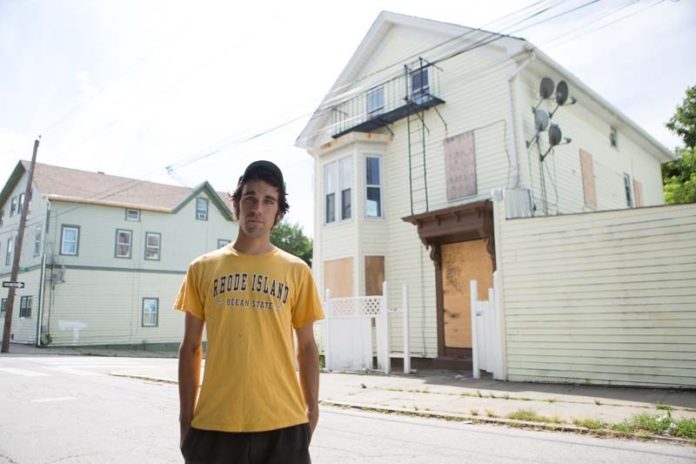
Providence is ramping up efforts to alleviate the burden of abandoned houses on neighborhoods hit hard by the foreclosure crisis.
Through methods including eminent domain, tax-title repossession and the authority of the reinvigorated Providence Redevelopment Agency, city officials are patching buildings up, tearing some down and funneling others into the hands of developers.
“We are using tools that were created but were never used,” said Providence City Solicitor Jeffrey Padwa, who leads the city’s nuisance-property task force and whose office works on most of the properties in question. “We’re being a little more aggressive in getting to those irresponsible owners.”
Reflecting that new aggressiveness, the city brought 442 cases to housing court for code and other violations in the just-completed fiscal 2013, 139 more cases than in the previous fiscal year and 259 more than in fiscal 2011. The city has increased the rate of demolitions for blighted or damaged buildings.
In the last month, the city has restarted the “clean and lien program,” which allows municipal crews to fix safety hazards on abandoned houses, clean them up and then bill the owner, or lender, to recoup the cost.
Padwa said in some cases the city is proactively calling up lenders where they think there might be a way to prevent an owner from walking away from a property.
And when that doesn’t work and a property falls behind on taxes, if there isn’t significant demand for it, the city is taking it over and then passing it along to the agency to find a redevelopment option.
Yet another option, which the city has started using with properties in good condition, is to have a judge appoint a receiver for a property to lease it out, recoup back taxes and keep it from deteriorating.
Community-development organizations who have been working to turn around blighted properties since the recession say they see the benefits of a more active approach from City Hall.
“That’s definitely making a difference,” said Frank Shea, executive director of the nonprofit Olneyville Housing Corp. “Between the mayor’s office and the city solicitors, they are engaged with us on a daily basis around problem properties and using the right tools to fix things.”
As an example, Shea pointed to a triple-decker on Amherst Street near the Joslin Community Center in Olneyville that had become unsightly and run-down after its owners walked away and their lender never bothered to foreclose.
The city did a “clean and lien” on it and, although still vacant, the building is now no longer a danger or an eyesore to the properties around it, Shea said.
Five years after the collapse of the housing bubble, Providence’s recovery from the foreclosure crisis remains slow and patchy.
The good news is the pace of homes being reclaimed by lenders has slowed.
Statewide in 2012, there were 1,633 foreclosures completed on all kinds of Rhode Island residential properties, down from 2,096 in 2011, 1,893 in 2010 and 2,840 in 2009, according to HousingWorks RI analysis of data from The Warren Group.
Providence has seen foreclosure totals drop more dramatically.
In the first quarter of this year, there were 75 foreclosures in the city compared with 117 in the first quarter of last year, 102 in the first quarter of 2011 and 126 in the first quarter of 2010.
While Padwa didn’t offer a definitive reason why the city had been more passive with abandoned properties in the past, he said the fear of being stuck with them without an exit strategy was certainly part of it. That’s the same reason many banks have dragged their heels on foreclosing buildings owners have walked away from.
Shea said while redevelopment challenges exist, city ownership is usually always better than bank ownership and very often better than investor ownership.
Since the crash, Shea said many investors have swooped in and purchased large numbers of distressed properties at very low prices, with the idea of sitting on them and waiting for the market to swing upward.
To better guide the efforts against nuisance properties, Providence is now measuring and mapping the landscape of abandoned buildings in ways it hasn’t before.
When the city switched the recycling and garbage containers it used last year, it had collectors report any homes that appeared abandoned. Those reports were then compiled in a list released in the new Open Data Portal.
The “potentially vacant property” list identifies 511 buildings that appeared abandoned, including a total of 1,097 units.
Last fall the city created another tool to combat problem properties, and another list, with City Council passage of an abandoned-property-registration ordinance.
The law requires the owners of buildings that are vacant and not being actively marketed to register with the city for a $100 fee that increases to $200 in the second year and $300 in subsequent years. Failure to register comes with a $250 per-day fine.
So far 88 properties have been registered, about 17 percent of the total suspected of being abandoned, according to Liz White, spokeswoman for Mayor Angel Taveras. The city has collected $8,900 with the registry so far.
To avoid foreclosures in the first place, Providence in 2009 was the first Rhode Island community to pass an ordinance requiring banks looking to foreclose on properties to submit to third-party mediation with the homeowners they are acting against.
Since that time, Cranston, Warwick, Warren and East Providence have followed suit and a bill passed by the General Assembly this month would extend it statewide.
Rhode Island Housing is the mediator in these cases and Executive Director Richard Godfrey said lenders have continued to become more open to working with distressed borrowers, but the majority of foreclosure cases are beyond repair by the time they get to him.
Over the past 18 months, Rhode Island Housing said they have received 1,327 notices from lenders wishing to foreclose on Providence properties.
Of those 1,327 cases, only 365 of the homeowners facing foreclosure have responded and said they would like to enter mediation.
Most of the homeowners who do go through mediation come to some settlement with the bank, with 179 foreclosures canceled, 41 postponed, 45 with some form of modification, 88 still pending and only eight where the lender has denied all proposals.
Godrey said most distressed homeowners don’t participate in mediation because of how far they are underwater and by the time they learn about the opportunity they have already walked away.
Many observers on the state and national levels have said loan principal forgiveness is the only way to solve these situations, but Godfrey isn’t advocating that path.
“We will work out of it as property values come up again,” Godfrey said. “Even though many homeowners are still underwater, they are less underwater than they were before.”
“If you go to principal forgiveness, somebody loses,” he added, “but if prices rise, nobody loses.” •












